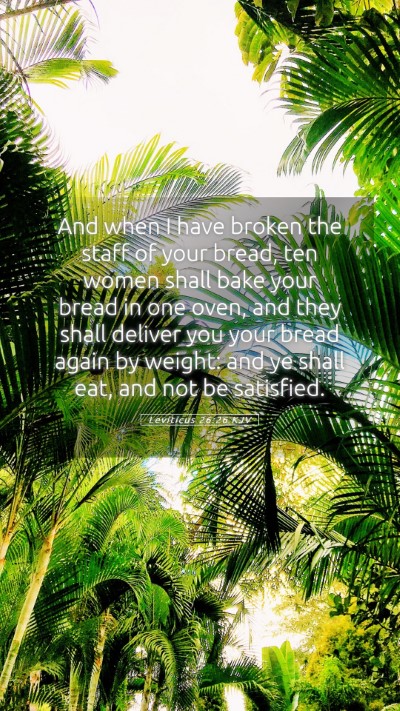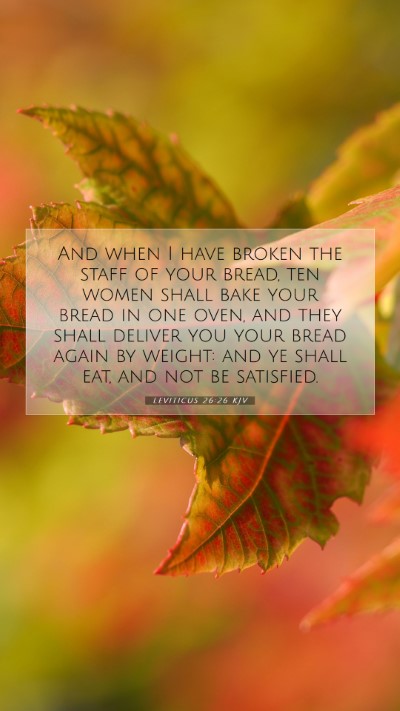Bible Verse Meaning: Leviticus 26:26
The verse Leviticus 26:26 states: "When I have cut off your supply of bread, ten women shall bake your bread in one oven, and they shall bring back your bread by weight; you shall eat and not be satisfied."
This verse serves as a stark reminder of the consequences of disobedience to God’s commands. The context of Leviticus 26 is a declaration of blessings for obedience and curses for disobedience, outlining the covenant between God and the Israelites.
Insights from Commentaries
-
Matthew Henry:
Matthew Henry emphasizes that this verse illustrates God's judgment and the drastic consequences for Israel's sin. The imagery of women baking bread in one oven signifies the scarcity and desperation that will prevail when God withdraws His blessings. The act of eating but not being satisfied points to spiritual and material emptiness that arises from straying from God's path.
-
Albert Barnes:
Albert Barnes notes that this verse reflects God’s ability to punish through famine, showcasing how reliance on human effort can turn futile when divine favor is lost. The conditions of hunger and dissatisfaction symbolize not only physical needs but also the deeper spiritual hunger that comes from separation from God.
-
Adam Clarke:
Adam Clarke provides an analysis of the communal aspects of this punishment, suggesting that when God removes prosperity, society will struggle. He interprets the 'weight' of bread as indicative of the scarcity leading to careful rationing, while also hinting at the futility of human efforts in the absence of divine provision.
Understanding the Verse in Context
Leviticus 26 outlines a series of blessings and curses based on the obedience of the Israelite people. The covenant they have with God includes direct consequences of their actions. This particular verse serves as a poignant reminder of what life will look like without God’s sustaining grace.
Application of Leviticus 26:26
In the modern context, this verse can be understood as a lesson about the importance of maintaining our relationship with God. It teaches about the spiritual consequences of neglecting God’s commandments, as well as the physical ramifications that can arise from such neglect.
Believers today can reflect on this verse to understand the significance of total reliance on God for all aspects of life, both spiritual and material.
Cross References
- Deuteronomy 28:47-48: This passage outlines the curses for disobedience, emphasizing loss of sustenance.
- Ezekiel 4:16: The prophet Ezekiel speaks of scarcity and the dire conditions linked to Israel's sins.
- Amos 8:11: A prophecy regarding famine, not for bread, but for hearing the words of the Lord, highlighting spiritual famine.
By understanding the comprehensive implications of Leviticus 26:26, individuals can gain valuable insights into the nature of God's covenant with humanity, the eternal truths of Scripture, and the importance of obedience and faithfulness in their walks with God.
Conclusion
This verse acts as a historical reflection on God's dealings with Israel, but its truths ring true for believers today, encouraging an understanding that equates our dependence on God with spiritual and physical sustenance. Such Bible verse explanations can enhance one's Bible study insights, leading to a deeper understanding of Scripture and a more profound application of biblical principles in daily life.


